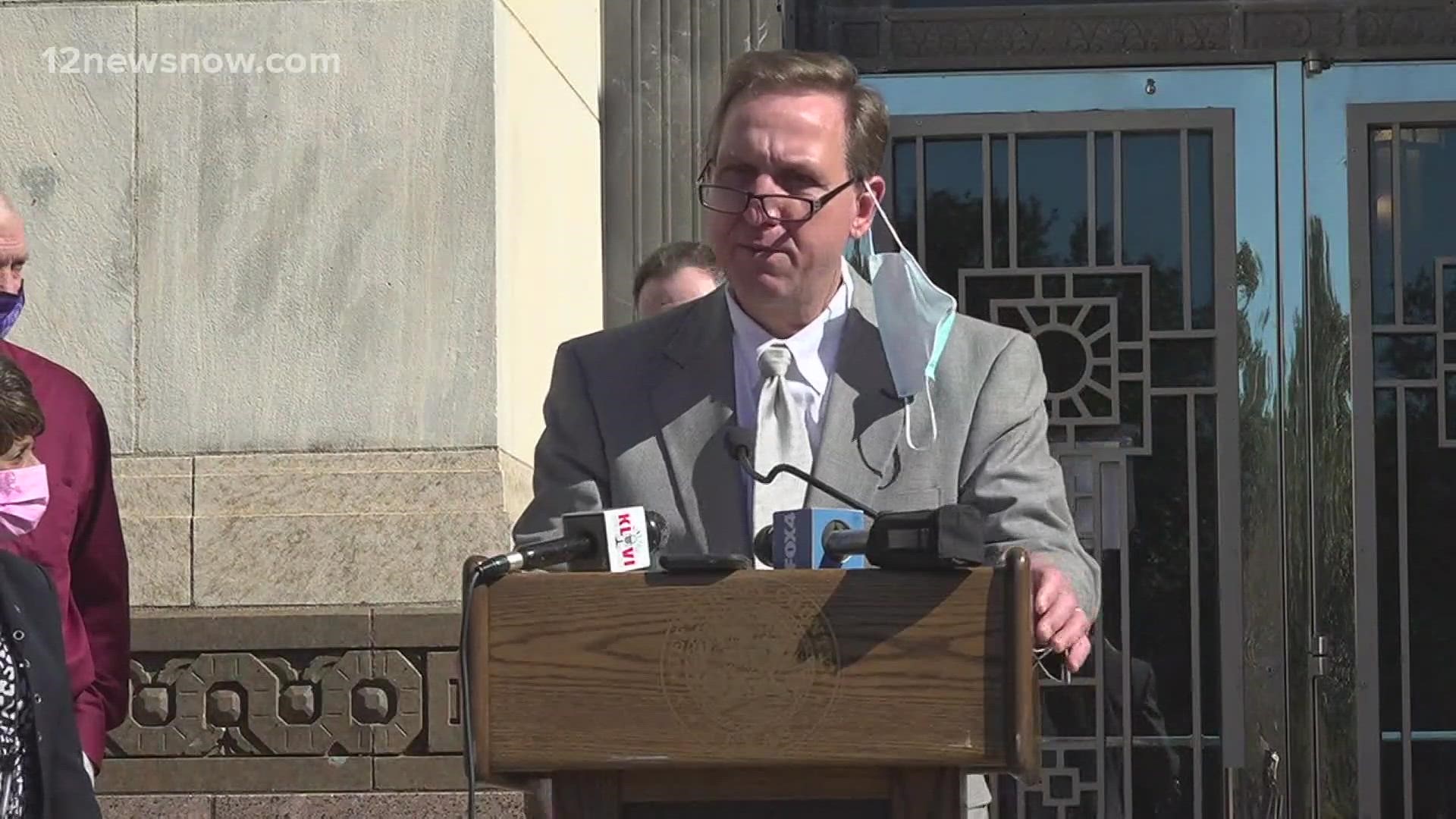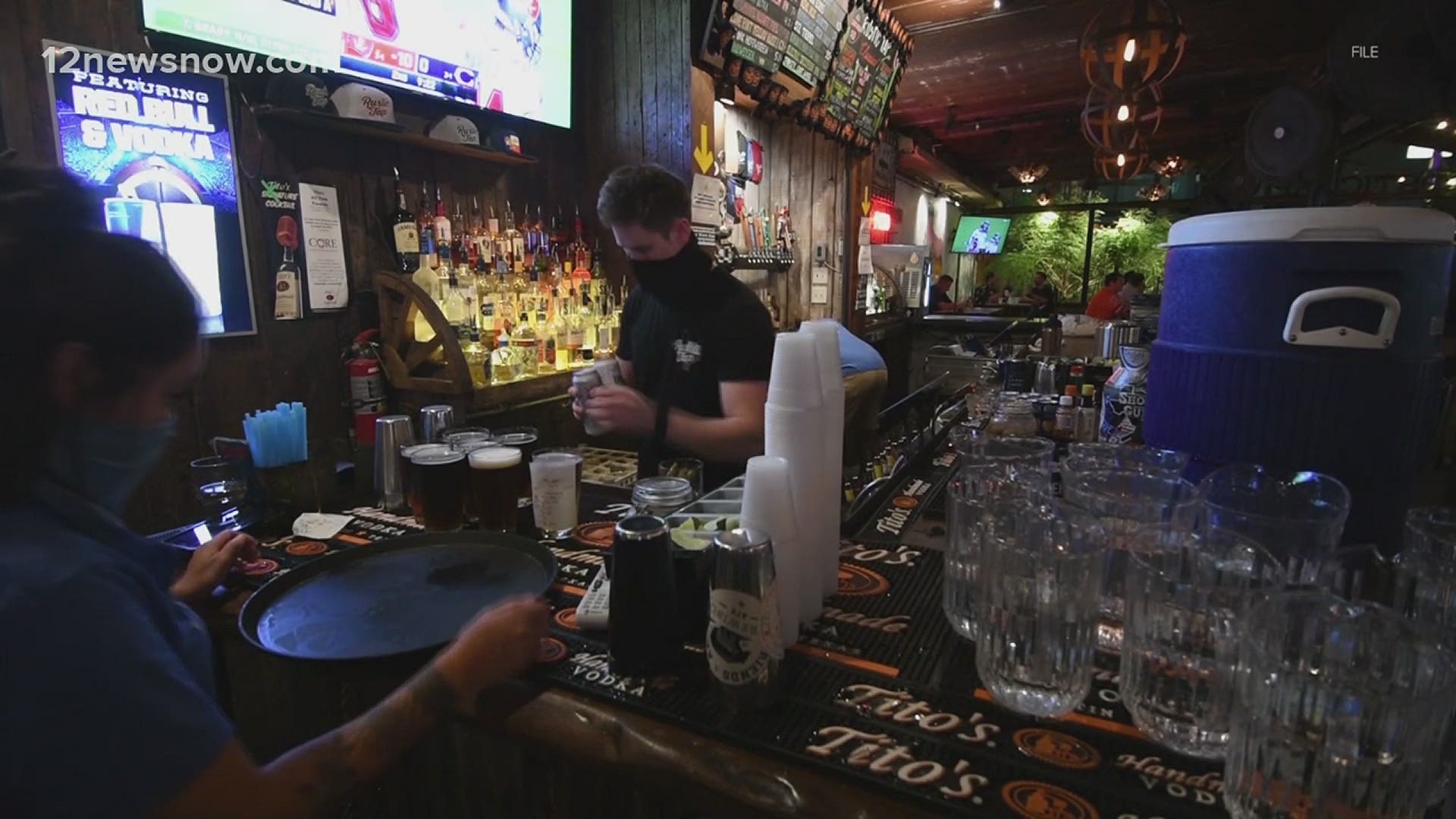BEAUMONT, Texas — Public health officials from seven Southeast Texas counties held a news conference Wednesday morning urging residents to celebrate Thanksgiving safely as the region sees an uptick in new coronavirus cases.
Health directors from the City of Beaumont and Port Arthur as well as from Chambers, Hardin, Jasper, Jefferson, Newton, Orange and Tyler Counties were in attendance at the news conference according to a news release from Hardin County Judge Wayne McDaniel.
The conference was scheduled for 11 a.m. on the steps of the Jefferson County courthouse.
Leaders gathered in hopes of educating Southeast Texans on celebrating Thanksgiving safely during the pandemic.
Just before the start of the news conference Hardin County Judge McDaniel sent the following information via email...
From a news release...
The following information from the Southeast Texas Regional Health Departments addresses how residents of Chambers, Hardin, Jasper, Jefferson, Newton, Orange, and Tyler Counties, including the City of Beaumont and City of Port Arthur, can safely celebrate Thanksgiving during the COVID-19 pandemic.
Like you, we in Public Health are tired of the COVID virus. We don't like the changes any more than you do. But over the last 8 months we have learned some things about this virus.
• It is shared person to person, as we do life together. It is shared when we gather to celebrate or eat meals. We share it with our co-workers, or when we gather for worship. It is shared as we practice and play sports or work out (even in the home gyms).
• Everyone responds differently to the virus. Many people only complain of 'sinus symptoms' or 'allergy symptoms'. 30% or more do not have a fever of 100.0° or higher. Most people, about 80%, have mild to moderate symptoms and don't need any help. But 20% are more severe and need some medical intervention of medication, oxygen or hospitalization. And, although the death rate is only 2-3% overall, it is up to 30% or higher the older you get and the more medical problems you have.
Please Make the Holidays Safer:
As the Holidays approach we are asking everyone to do things a bit differently. The larger the family gathering, the higher your chances of being exposed to the virus. Try to keep your family gatherings to those that already live in your household or just the people you already interact with and already do life with.
If you are ill or have any symptoms, do NOT attend any gathering or be around other people. If you have COVID and have not met CDC criteria for release from isolation, or you have been around anyone with COVID, or who has been ill in the previous 14 days, do NOT attend any gathering or be around other people.
If you do plan to be with others outside your household, then:
• Stay at least 6 feet (2 arm lengths) away from the other people and wear a mask.
• Wear a face covering or mask that is at least 2 layers of cloth and covers your nose and your mouth. It should fit snugly against the sides of your face and should wrap under your chin. This is about protecting others from your germs.
• Wash your hands often, with soap and water for 20 seconds. If water is not available, use hand sanitizer with at least 60% alcohol. Wash or sanitize your hands before you touch your face or remove your mask.
If you are attending a gathering, please consider the following:
• Have the gathering outside. If it is inside, open windows and leave doors open to keep air moving.
• Bring your own food, drinks, plates, cups and silverware.
• Wear a mask. Wear the mask when dishing food. Keep the mask safely stored (not laying on the table) when you are eating or drinking.
• Consider using disposable items such as paper plates and glasses, and single serving condiments like ketchup, salt and pepper.
• Avoid food preparation areas - It is not the preparing of the foods, it is the talking, visiting and closeness as we prepare the foods that helps spread the virus.
• If you choose to share food, have 1 person serving that is wearing gloves and a mask.
• Clean frequently touched surfaces often (door handles, counter tops, backs of chairs).
After the Gathering:
Consider staying in quarantine for 14 days, particularly if you have traveled, or have been around travelers, or were around others not from your household. At a minimum, be vigilant about keeping your distance from others and wearing a mask properly. Everyone should monitor themselves for symptoms for 2 weeks after the gathering. If anyone does get ill, even mild illness, please let the others at the gathering know and consider getting tested.
Coronavirus symptoms
The symptoms of coronavirus can be similar to the flu or a bad cold. Symptoms include a fever, cough and shortness of breath, according to the Centers for Disease Control.
Most healthy people will have mild symptoms. A study of more than 72,000 patients by the Centers for Disease Control in China showed 80 percent of the cases there were mild.
But infections can cause pneumonia, severe acute respiratory syndrome, kidney failure and even death, according to the World Health Organization. Older people with underlying health conditions are most at risk.
The CDC believes symptoms may appear anywhere from two to 14 days after being exposed.
Human coronaviruses are usually spread through...
- The air by coughing or sneezing
- Close personal contact, such as touching or shaking hands
- Touching an object or surface with the virus on it, then touching your mouth, nose or eyes before washing your hands.
Help stop the spread of coronavirus
- Stay home when you are sick.
- Eat and sleep separately from your family members
- Use different utensils and dishes
- Cover your cough or sneeze with your arm, not your hand.
- If you use a tissue, throw it in the trash
Lower your risk
- Wash your hands often with soap and water for at least 20 seconds. If soap and water are not available, use an alcohol-based hand sanitizer.
- Avoid touching your eyes, nose, and mouth with unwashed hands.
- Avoid close contact with people who are sick.
- Clean and disinfect frequently touched objects and surfaces.
- If you are 60 or over and have an underlying health condition such as cardiovascular disease, diabetes or respiratory illnesses like asthma or COPD, the World Health Organization advises you to try to avoid crowds or places where you might interact with people who are sick.


